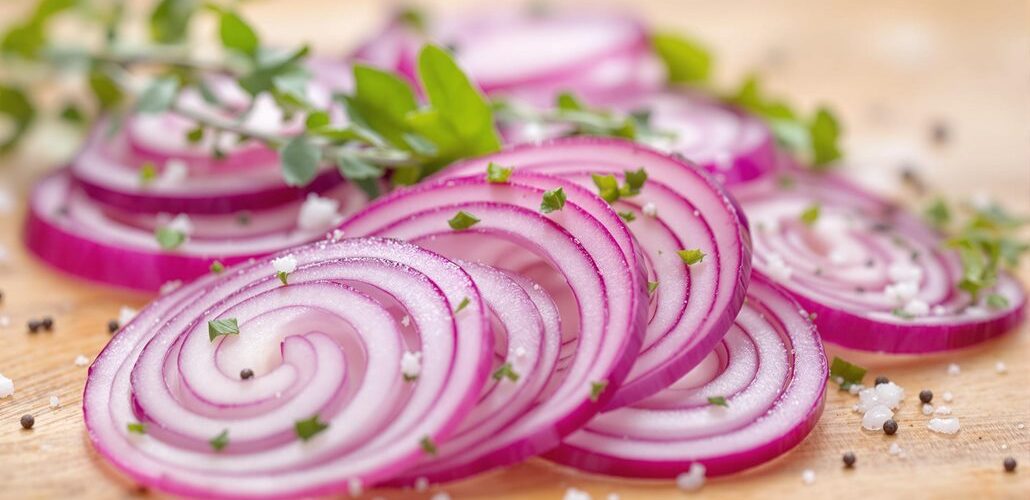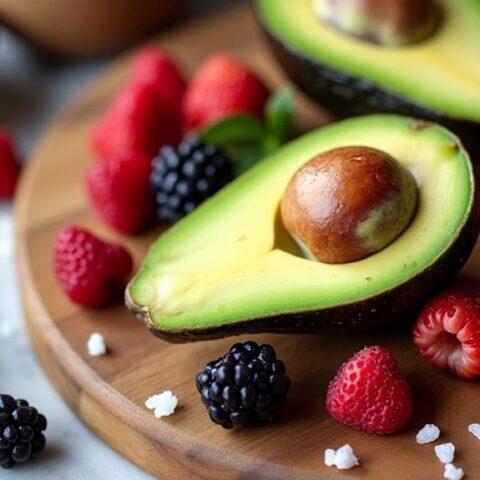
Calculating carbohydrates in red onions is key for aligning your diet with nutritional objectives. A 100g serving contains approximately 7.9g of carbohydrates, with net carbs at 6.4g after fiber. This makes red onions a moderate carb option, suitable for various dietary patterns. When portioning, a medium-sized onion at 180g offers around 14.2g of carbs, while 1 cup provides 12.2g of net carbs. These can be included in meals for their flavor and health benefits, such as antioxidants and digestive support. Exploring culinary uses and accurate tracking tools will further enhance your dietary strategies.
Key Takeaways
- A 100g serving of red onions contains approximately 7.9g of carbohydrates, with 6.4g as net carbs after fiber subtraction.
- Use kitchen scales to accurately measure red onion portions for precise carbohydrate tracking in your diet.
- MyFitnessPal and similar apps can help log the 12.2g net carbs in a 1 cup (160g) serving of red onions.
- Red onions have a higher carbohydrate content compared to white onions but lower than yellow onions.
- Maintain a food diary to track daily carbohydrate intake, including contributions from red onions.
Understanding Carbohydrates in Red Onions
When examining the nutritional profile of red onions, understanding their carbohydrate content is vital for anyone monitoring their intake. Red onions, a staple in many balanced diets, are primarily composed of carbohydrates, which make up nearly 100% of their macronutrient profile. A 100g serving of red onions contains approximately 7.9g of carbohydrates, including about 1.5g of dietary fiber. This fiber content helps mitigate the impact on blood sugar levels, providing a more gradual energy release.
In terms of net carbohydrates, a 1 cup (160g) serving of chopped red onions delivers about 12.2g after accounting for fiber. This makes them a suitable addition to low-calorie meal plans, with their carbohydrates primarily derived from natural sugars and starches. The sugar content is around 6.8g per 160g serving, contributing to the mild sweetness that enhances various dishes without greatly affecting calorie intake.
For those incorporating red onions into a balanced diet, it is vital to reflect on their carbohydrate contribution. This reflection guarantees that red onions are used effectively within dietary guidelines, supporting overall health and nutritional goals.
Nutritional Profile of Red Onions
Red onions offer a balanced nutritional profile, with a 100g serving providing approximately 7.9g of carbohydrates and a low caloric content of 72 calories per 180g serving.
This makes them a suitable option for those monitoring carbohydrate intake while seeking to benefit from their 2.6g of dietary fiber, which supports digestive health and may help regulate blood sugar levels.
Additionally, their minimal fat content and subtle natural sweetness contribute to their versatility in a health-conscious diet.
Calorie and Macronutrient Content
Delving into the nutritional profile of red onions reveals their modest caloric content and beneficial macronutrient composition, making them a valuable addition to a balanced diet. With approximately 40 calories in red onions per 100g serving, they provide a low-calorie option for those tracking their intake in a food diary.
The carbohydrate content, integral to energy provision, stands at 7.9g per 100g serving, with sugars contributing to 6.8g per cup (160g) serving. This makes red onions a carbohydrate-rich food, beneficial for those requiring energy in their dietary regimen.
In addition to carbohydrates, red onions offer 1.2g of protein per 100g serving, supporting tissue repair and muscle maintenance. Their fat content is negligible, with only 0.2g per 100g, underscoring their suitability for low-fat dietary preferences.
Importantly, the fiber content should not be overlooked; with 1.5g of dietary fiber per 100g, red onions can aid digestive health and help manage carbohydrate intake. A 2 oz (56g) serving provides approximately 2.6g of fiber, enhancing satiety and digestive function.
These nutritional attributes make red onions a strategic choice for individuals seeking to optimize their dietary macronutrient balance.
Health Benefits Overview
Frequently celebrated for their vibrant color and robust flavor, red onions offer a range of health benefits that extend beyond their culinary appeal. With approximately 40 calories per 100 grams, red onions are a low-calorie vegetable choice that fits well into a balanced diet. Rich in carbohydrates, they contain 7.9 grams per serving, primarily providing energy. Additionally, the dietary fiber content, at 1.5 grams per 100 grams, supports digestive health and aids in maintaining regular bowel movements.
These onions are also significant for their antioxidant properties, particularly quercetin, which may help reduce inflammation and promote heart health. Low in fat and protein, with only 0.2 grams of fat and 1.2 grams of protein per 100 grams, red onions are mainly a carbohydrate source.
| Nutrient | Amount per 100g | Health Benefit |
|---|---|---|
| Calories | 40 | Low-calorie energy source |
| Carbohydrates | 7.9g | Energy provision |
| Dietary Fiber | 1.5g | Supports digestive health |
| Vitamin C | 11.8mg | Boosts immune function |
Moreover, red onions are a good source of vitamins and minerals, offering 11.8 mg of Vitamin C and 36.8 mg of calcium per serving, which support immune function and bone health respectively.
Health Benefits of Red Onions
Among the various vegetables that contribute to a balanced diet, red onions stand out for their numerous health benefits. Renowned for their antioxidant properties, red onions are particularly rich in quercetin, a flavonoid that plays a significant role in reducing oxidative stress. This antioxidant activity is linked to potential cardiovascular support, as it may lower blood pressure and enhance heart health.
The anti-inflammatory effects of red onions further contribute to their health-promoting profile, potentially reducing the risk of chronic diseases such as arthritis and certain cancers.
In addition to their antioxidant and anti-inflammatory benefits, red onions offer substantial support for digestive health. With 2.6 grams of fiber per 100 grams, they aid in maintaining healthy digestion and promoting regular bowel movements. This fiber content, coupled with the presence of essential vitamins and minerals like vitamin C and folate, supports immune function and overall well-being.
Moreover, regular consumption of red onions has been associated with improved cardiovascular health. They have shown potential in reducing cholesterol levels and enhancing blood circulation, further substantiating their role in supporting heart health and reducing the risk of cardiovascular diseases.
How to Measure Carbs in Red Onions
Understanding the carbohydrate content in red onions is essential for individuals who monitor their carb intake for dietary reasons, such as managing diabetes or following a low-carb diet. Red onions are a low-carb vegetable, providing approximately 7.9 grams of carbohydrates per 100-gram serving.
However, when carb counting, it's vital to take into account the net carbs, which account for fiber content. In red onions, about 1.5 grams of the total carbohydrates is dietary fiber. Hence, the net carb count for a 100-gram serving is 6.4 grams, calculated by subtracting the fiber from the total carbohydrates.
Accurate carb counting requires careful attention to portion sizes. A medium red onion typically weighs around 180 grams, equating to about 14.2 grams of total carbohydrates.
For precise carb management, especially for meal planning, it is advisable to weigh your red onions. This practice guarantees that you have an accurate measure of the carbs you are consuming, as sizes can vary widely between onions.
Incorporating Red Onions in Your Diet
Incorporating red onions into your diet offers a range of nutritional benefits, including their low-calorie profile and rich fiber content, which supports digestion and overall health.
Culinary uses for red onions are diverse, as they can enhance salads, salsas, and various dishes with their natural sweetness and antioxidants, all while allowing for controlled carbohydrate intake.
To maintain freshness and maximize their nutritional value, storing red onions in a cool, dry place away from direct sunlight is recommended.
Nutritional Benefits Overview
Red onions offer a nutritionally robust profile that can enhance the overall quality of your diet. Known for their diverse red onion varieties, they have long been a staple in flavor enhancement across various culinary traditions. With approximately 14.2 grams of carbohydrates per 2 oz serving, they provide a low-calorie option for those looking to add depth to their meals without greatly increasing carb intake.
- Dietary Fiber: Red onions contain 2.6 grams of dietary fiber per serving, promoting digestive health and supporting a balanced gut microbiome.
- Antioxidants: Rich in antioxidants like quercetin, red onions may contribute to reduced inflammation and improved heart health, offering benefits that extend beyond their modest carbohydrate content.
- Vitamins and Minerals: They bring essential nutrients to the table, including 11.8 mg of vitamin C and 233.6 mg of potassium per serving, which play vital roles in immune function and maintaining electrolyte balance.
Additionally, the sugar content of red onions is about 6.8 grams per serving, making them suitable for individuals monitoring their sugar intake.
Therefore, incorporating red onions into your diet can enhance the nutrient density of your meals, making them a valuable addition for those seeking to optimize their nutritional intake.
Culinary Uses Explained
Often celebrated for their versatility, red onions seamlessly integrate into a variety of culinary applications, making them an invaluable component in a balanced diet. Their mild flavor and crunchy texture make them ideal for raw consumption in salads, contributing approximately 7.9g of carbohydrates per 100g serving. Such creative recipes enhance not only the nutritional profile but also the sensory experience of meals.
Cooking techniques like grilling or sautéing transform red onions by caramelizing their natural sugars, which amplifies their sweetness and enriches dishes such as stir-fries and fajitas. This method of preparation not only enhances flavor pairings with proteins and vegetables but also adds a nutritious dimension with antioxidants and dietary fiber.
Moreover, pickling red onions offers a tangy topping for tacos, burgers, or salads, preserving their crunch and adding vibrant color. This technique retains their nutrient content while offering a low-calorie option, with only about 40 calories per 100g.
Additionally, blending red onions into dressings or marinades infuses dishes with robust flavor without considerably increasing caloric intake. By incorporating red onions into your diet, you can enjoy their unique culinary benefits while aligning with nutritional goals.
Storage Tips Provided
Proper storage of red onions is vital for maximizing their nutritional benefits and culinary utility. To preserve their freshness and flavor, it is important to understand the best storage conditions. Red onions should be stored in a cool, dry place, away from direct sunlight. This helps prevent premature sprouting and decay.
For extended shelf life, refrigerating red onions is advisable. However, they must be kept in a breathable container to maintain proper moisture control and prevent mold growth.
Consider these key storage tips:
- Cool and Dry Environment: Store whole red onions in a well-ventilated area to maintain their crisp texture and nutritional integrity.
- Refrigeration Best Practices: Use breathable containers for cut or peeled onions to manage moisture control and extend freshness.
- Pickling for Longevity: Pickle red onions for an enhanced flavor profile, allowing them to be preserved in the refrigerator for several weeks.
When incorporating red onions into your diet, remember that peeling them releases their strong aroma and enhances their versatility in dishes.
While they can last for weeks when stored correctly, sliced or chopped onions should be used promptly to avoid spoilage, allowing you to benefit fully from their nutrients.
Comparing Red Onions to Other Onions
When analyzing the nutritional profiles of various onion types, notable differences in carbohydrate content emerge. Red onion varieties, known for their milder sweetness and vibrant color, contain approximately 7.9 grams of carbohydrates per 100 grams. This is slightly higher than white onions, which have about 6.9 grams, but lower than yellow onions at around 9.3 grams per 100 grams. The carbohydrate content in red onions is primarily composed of natural sugars, providing about 6.8 grams per serving.
Red onions are often preferred in culinary applications for raw dishes due to their appealing onion flavor profiles. In contrast, the sharper taste of yellow and white onions makes them more suitable for cooking techniques that involve heat, such as sautéing and caramelizing.
| Onion Type | Carbohydrates (g/100g) | Primary Use |
|---|---|---|
| Red | 7.9 | Raw dishes, salads |
| White | 6.9 | Cooking, mild flavor |
| Yellow | 9.3 | Cooking, strong flavor |
| Green | 4.5 | Garnishes, mild flavor |
| Shallot | 16.8 | Dressings, sauces |
Additionally, red onions have a higher antioxidant capacity than their white counterparts, potentially influencing carbohydrate metabolism and conferring health benefits. Understanding these differences assists in making informed dietary choices tailored to individual nutritional needs and cooking preferences.
Tools for Tracking Carbs
Understanding the variations in carbohydrate content among different types of onions, particularly red onions, is vital for those who wish to optimize their dietary plans. Tracking carbs accurately is imperative for maintaining a balanced diet, especially for individuals managing conditions like diabetes.
It's important to be aware that keto flu symptoms like fatigue and headaches may occur when drastically reducing carb intake. Tools for carb counting, such as app tracking, food diaries, and online databases, offer invaluable assistance in this endeavor.
- App Tracking: Utilize mobile applications like MyFitnessPal or Nutracheck to log the carbohydrate content of red onions. These apps can efficiently track the 14.2g of carbs per 2 oz serving, providing real-time insights into your dietary intake.
- Portion Control: Employ kitchen scales to guarantee precise serving sizes. For instance, knowing that 100g of red onion contains approximately 7.9g of carbohydrates helps maintain accurate portion control, thereby aligning with nutritional goals.
- Carb Counting: Maintain a food diary to manually track carb intake. Recording the 12.2g of net carbs in a 1 cup serving of chopped red onions can enhance awareness and enable adjustments in your dietary plan.
Online nutritional databases offer further detailed insights, helping individuals manage their daily carb limits effectively, including monitoring the 6.8g of sugar in red onions.
Frequently Asked Questions
How Many Carbs Are in 100G of Red Onion?
A 100g serving of red onions contains approximately 7.9g of carbohydrates, including 1.5g dietary fiber, enhancing digestive health. Their nutritional value and natural sweetness offer versatile cooking uses, highlighting red onion benefits in diverse culinary applications.
How Many Carbs Do Red Onions Have?
Red onions, a flavorful addition to various onion varieties, contain approximately 7.9g of carbohydrates per 100g. Their nutritional benefits include fiber and sugars, enhancing dishes through diverse cooking techniques while supporting dietary goals in a balanced manner.
Can You Eat Red Onions on a Low Carb Diet?
Certainly, red onions can be included in a low-carb diet. Their benefits, such as high fiber and antioxidants, make them ideal for low-carb recipes. Consider vegetable alternatives, but red onions offer unique nutritional advantages when consumed moderately.
How Much Red Onion Should I Eat a Day?
For ideal red onion benefits, a daily intake of 1/4 to 1/2 medium onion is recommended. This serving suggestion balances flavor enhancement with nutritional needs, providing dietary fiber while aligning with carbohydrate monitoring for a healthy diet.
Conclusion
Red onions, with their unique nutritional profile, offer numerous health benefits while contributing a moderate carbohydrate content suitable for various diets. Understanding and accurately measuring the carbohydrate content in red onions is crucial for effective dietary planning. By comparing red onions to other onion varieties and utilizing appropriate tools for tracking carbohydrate intake, individuals can incorporate red onions into their diets successfully. This approach guarantees that the nutritional advantages of red onions are maximized within a balanced dietary framework.









No Comments